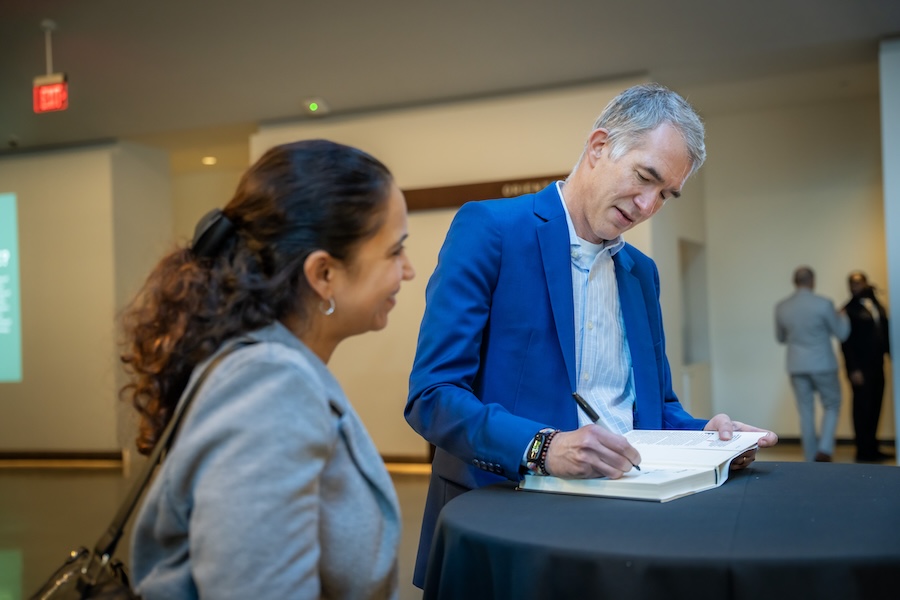Epic Disruptions? They’ve Happened Before. Here’s What We Can Learn From Them


What can a 19th-century nurse teach us about AI? Everything, says innovation expert Scott Anthony.
Florence Nightingale is remembered as a compassionate caregiver, but Anthony, a clinical professor at Dartmouth University, recast her as a master of systemic disruption at From Day One’s Boston conference during a fireside chat with Adi Ignatius, editor at large, at Harvard Business Review.
“She drove deep systemic change in healthcare,” Anthony said. “She did it through data. She did it through visualization. She shows us what it takes to drive system change.”
Anthony, the author of Epic Disruptions: 11 Innovations That Shaped Our Modern World, says that the principles behind history’s most significant innovations are the tools needed to build a more human-centric future as AI disrupts life as we know it.
Florence Nightingale and the Art of System Change
History offers “fiercely urgent teachings” for modern executives, providing a map to follow when the path forward is obscured, says Anthony.

“We’re in a world right now that can be characterized as being shrouded in dense fog,” he said. “You have technologies advancing exponentially. Lines between industries, blurring expectations of your customers, your colleagues, your children, shifting very rapidly, and shock after shock coming after you.”
The natural human tendency is to slow down in these conditions, yet the modern imperative is to move faster than ever. He cites Florence Nightingale to illustrate how to drive meaningful change, noting she was a powerful systems innovator, not just the “lady with the lamp.”
Nightingale’s work highlights that leaders can’t just do one thing to change systems; change always requires a multifaceted approach. “HR executives need to drive system change in your organizations,” Anthony said. “Florence Nightingale shows the components for how to do it.”
Disruption as a Path to Optimism
The conversation naturally turned to the most significant source of disruption in the modern era: artificial intelligence. “AI is one of these ones where you’ll say there was a before [and] there was an after,” he said, placing artificial intelligence in the same category as the compass, gunpowder, and the printing press.
Anthony acknowledges the messy middle that such transformations often entail, drawing a parallel to the 1920s, when automobiles flooded cities designed for pedestrians, horses, and carriages. Such disruption required new technology (traffic lights), new norms (sidewalks), and new regulations.
“We will need these things for AI as well,” he said, warning that a hands-off approach during periods of immense transformation is a “horrible thing.”
Leaders must also contend with the deep fears many people have regarding artificial intelligence. Anthony teaches a class on generative AI at Dartmouth, and even in a risk-free, pass-fail environment, “at least half of the class is terrified because there’s something about AI that we feel like hits our humanity, and if we adopt it too much, we lose something, ”he said. Acknowledging and addressing this fear is an executive responsibility.
The Innovator’s Mindset
“Disruption rewards patience and perseverance,” Anthony said. “There are no overnight successes. It just doesn't happen.” Like in the case of American chef and author Julia Child, who finally published her first cookbook, Mastering the Art of French Cooking, after spending a decade working on it, going through multiple publishers, and a near-death experience. The key for leaders is to be “patient for growth and profits,” but “impatient for proof points.”
Anthony highlights the ability to embrace paradox as the single most important trait of leaders who successfully navigate disruption. He illustrated this mindset through a former Procter & Gamble executive who drove disruptive growth for products like Swiffer® and Febreze®, creating entirely new categories in household products.
“Ghosts,” as Anthony calls it, or the invisible forces of past traumas, present patterns, and future fears, hold organizations back. Ghosts can manifest as a fixation on past IT failures, inertial routines that stifle experimentation, or the existential fear that adopting AI will change an organization’s identity.
To combat these ghosts, Anthony points to a ritual used at Airbnb called “elephants, dead fish, and vomit.” “Elephants, what are the big things that nobody's talking about? Dead fish, what are the things that are in the corner of the room that are stinking up the room? Vomit, what's the stuff that you just need to say?” This practice, he says, helps bring unspoken friction to the surface so it can be addressed.
Anthony ended the conversation with a final piece of advice, an anecdote from 1548, when King Edward VI issued a proclamation “against those that doeth innovate.” While such unproductive regulations are less likely to be issued today, Anthony says the fears that drove them are still prevalent. “My ask for you is to find ways to replace that fear with fun. When we’re playing, when we’re experimenting, when we’re trying new things, everything changes.”
Ade Akin covers workplace wellness, AI, HR trends, and digital health solutions.
(Photos by Josh Larson for From Day One)
The From Day One Newsletter is a monthly roundup of articles, features, and editorials on innovative ways for companies to forge stronger relationships with their employees, customers, and communities.